note: the second half of this post is supposed to be hidden behind a clickable "read-on" link, but blogger's "span/fullpost" etc html doesn't seem to be working anymore. Does anybody know the story? Any alternatives? Just looking at this solution makes me want to go back to pen and paper. Until then, sorry for the length of this post.
• In 1971, while rushing to dinner with his wife, the French poet Jean Follain (well discussed here), died after being struck by a car on a Paris corner. It was the exact corner on which his father had been knocked down and killed years previously. 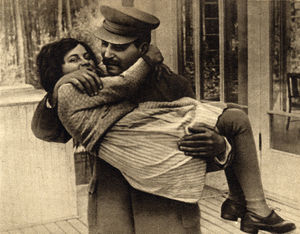 •
•
In 1970, Svetlana Alliluyeva Stalina (seen, right, aged nine with her devoted daddy Joseph Stalin), received an invitation from the widow of the architect Frank Lloyd Wright. Stalina had recently defected to the U.S., causing uproar in the USSR for her denouncement of her father's regime and the publication of her memoir Twenty Letters To a Friend. Wright's widow invited her to come and visit her at Taliesin West, Wright's winter home and school in the desert of Arizona. A mystic, she was convinced that Stalina was a spiritual replacement for the daughter she had lost in a car crash, a woman also called Svetlana, who had been married to Wright's chief apprentice, William Peters. Stalina visited Arizona and had agreed within weeks to marry Peters. Stalina now lives in a retirement home in Wisconsin. 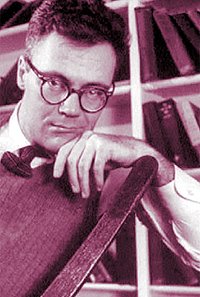 • Robert Lowell taught an undergraduate workshop in poetry at Harvard in the early 1970s. In lieu of the usual workshop approach of reading and/or listening to the poems of participating students, Lowell preferred to read aloud from a battered anthology of poems he admired. Every so often he would turn to the students, with ten minutes left to go before class ended, and ask them to read a poem. They were mostly eighteen years old, and understandably reluctant to follow in the wake of Marvell, Browning and Yeats. One of the students took a shine to an attractive girl in the class. One day, after class had ended, he asked her out. She walked away without speaking to him. A classmate filled him in on his faux-pas: he had just propositioned the Lowell girlfriend of that class. There was one in every class. Also, there was Elizabeth Hardwick, the wife he was in the process of leaving, and Lady Caroline Blackwood, the wife he was in the process of acquiring. Lowell was eccentric, but generous. He invited the whole class out to a meal in Cambridge. They all went. Meanwhile, Lowell went to the airport and took a flight to London, where he lived for pretty much the rest of his life.
• Robert Lowell taught an undergraduate workshop in poetry at Harvard in the early 1970s. In lieu of the usual workshop approach of reading and/or listening to the poems of participating students, Lowell preferred to read aloud from a battered anthology of poems he admired. Every so often he would turn to the students, with ten minutes left to go before class ended, and ask them to read a poem. They were mostly eighteen years old, and understandably reluctant to follow in the wake of Marvell, Browning and Yeats. One of the students took a shine to an attractive girl in the class. One day, after class had ended, he asked her out. She walked away without speaking to him. A classmate filled him in on his faux-pas: he had just propositioned the Lowell girlfriend of that class. There was one in every class. Also, there was Elizabeth Hardwick, the wife he was in the process of leaving, and Lady Caroline Blackwood, the wife he was in the process of acquiring. Lowell was eccentric, but generous. He invited the whole class out to a meal in Cambridge. They all went. Meanwhile, Lowell went to the airport and took a flight to London, where he lived for pretty much the rest of his life. 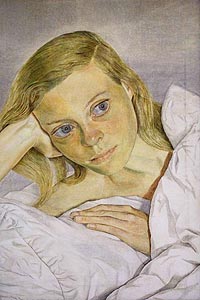 • Something I remembered tonight about Lowell: when he died of a heart attack in 1977 in the back of a New York cab, he was returning from JFK airport, having flown there from Dublin. There, he had finally ended his marriage with Blackwood, who was an heir to the Guinness fortune and lived on the family estate at Castletown House, Co. Kildare. When Lowell died, he was on his way back to Hardwick, who lived in Manhattan. He died with a painting in his arms. It was a portrait, now famous, of Blackwood, by her previous husband Lucien Freud. I think I remember hearing somewhere that he had robbed it from Castletown's walls. But maybe I'm imagining that bit.
• Something I remembered tonight about Lowell: when he died of a heart attack in 1977 in the back of a New York cab, he was returning from JFK airport, having flown there from Dublin. There, he had finally ended his marriage with Blackwood, who was an heir to the Guinness fortune and lived on the family estate at Castletown House, Co. Kildare. When Lowell died, he was on his way back to Hardwick, who lived in Manhattan. He died with a painting in his arms. It was a portrait, now famous, of Blackwood, by her previous husband Lucien Freud. I think I remember hearing somewhere that he had robbed it from Castletown's walls. But maybe I'm imagining that bit.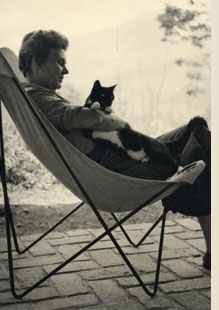 • Teaching in Harvard at the same time as Lowell was his great friend, the poet Elizabeth Bishop. His classes were taught in a penthouse with a stunning view of Cambridge; hers were taught in a damp basement. She was calmer than Lowell, which wouldn't have been difficult. She grew exasperated with her students, who were desperately self-conscious about their readers, their potential readers, their imagined readers, and about what all these people might say about what had been written or appropriated or revealed, when in fact their poems had, as of yet, no readers at all save for themselves and their teachers. She slammed a notebook down on the desk one day and said to her students, look. When you begin work on a poem, the thoughts that go into that and the material that goes into that process forms a bridge between you and hte page. And when your reader reads the finished poem, the poem forms a second bridge between the page and them. And your readers will never see the first bridge. Only the second one. So stop thinking about what your readers will think of your material. They will never be on that bridge.
• Teaching in Harvard at the same time as Lowell was his great friend, the poet Elizabeth Bishop. His classes were taught in a penthouse with a stunning view of Cambridge; hers were taught in a damp basement. She was calmer than Lowell, which wouldn't have been difficult. She grew exasperated with her students, who were desperately self-conscious about their readers, their potential readers, their imagined readers, and about what all these people might say about what had been written or appropriated or revealed, when in fact their poems had, as of yet, no readers at all save for themselves and their teachers. She slammed a notebook down on the desk one day and said to her students, look. When you begin work on a poem, the thoughts that go into that and the material that goes into that process forms a bridge between you and hte page. And when your reader reads the finished poem, the poem forms a second bridge between the page and them. And your readers will never see the first bridge. Only the second one. So stop thinking about what your readers will think of your material. They will never be on that bridge.
• In French graveyards - at least in some French graveyards - there is a symbol for the grave of a suicide.
• In 1910, Houdini was the first man to fly an airplane successfully in Australia. As well as flying, he performed. During one performance in Melbourne, he jumped, bound in chains, from a high bridge into a river. Moments later, he resurfaced, free of his chains, and saw in the water beside him something that nearly caused him to drown.  • The Polish poet Zbigniew Herbert (right), who would have been 82 this week had he lived, was a descendant of George Herbert, somehow.
• The Polish poet Zbigniew Herbert (right), who would have been 82 this week had he lived, was a descendant of George Herbert, somehow.
• On the last three points, learn more below. You'll have to read some poems. They are worth reading. I suppose I shouldn't really be printing them in full. But I am.
Outside Perpignan in Heavy Rain from In the Year of the Comet (1992) by Nicholas Christopher
The trees sway darkly
along the black wall with its vines.
For shelter, a cat squeezes between the steel bars over a window.
This is where the caretaker lives,
catty-corner to the cemetery,
with a door the color of stone.
We've just descended the mountains,
windshield wipers slapping mud
while we talked about the acrobat
who was in the papers in Barcelona
yesterday; how he attempted
to perch blindfolded on the highest
steeple of the Gaudí cathedral.
Through the gate, in the first
row of gravestones, a statue
depicts a young woman
raising her hand to her face:
the mortuary sign for a suicide.
Is she about to touch her forehead?
to tear out her hair?
to dig her nails into her cheek?
to stifle a cry
or make the sign of the cross?
In this life which is the only life
it is a gesture we see every day.
You say someone in a position
to know told you it's easy
to learn about these things
without ever learning anything at all.
Without ever running out of questions.
When that acrobat fell in bright sunlight,
did all the women in the street raise
their hands to shield their eyes?
From 5º (5º and Other Poems, 1995) by Nicholas Christopher
In 1910 Houdini was the first man to fly
an airplane successfully in Australia.
It was a biplane, purchased in France,
which he took to Melbourne on a ship.
During the two-week voyage,
he was continually seasick,
yet spent hours in the cargo hold,
poised at the controls of his plane.
He had HOUDINI painted on the fuselage
and wings in red and gold.
In Melbourne he gave two performances nightly.
He made a full-grown elephant disappear.
He caused a man's top hat to fill with coins.
He had himself submerged, straitjacketed
and handcuffed, in a tank of ice water.
Then he left his wife at their hotel and hurried
to a desert airstrip to sit in his plane.
He kept this up for weeks, studying charts,
waiting for the weather to clear.
On the evening of February 18th, a crowd
watched him leap manacled from Queen's Bridge
into the muddy waters of the Yarra River.
Moments later, a dead man floated to the surface.
The onlookers panicked, and when Houdini
reappeared, he was so startled to see
the corpse that he nearly drowned
and had to be hauled
into a rowboat by his attendants.
Finally, on March 16th, under cloudless skies,
he took off in his plane, circled, and landed.
He completed three flights that day,
covering seven miles at an altitude of ninety feet.
At each stop, bigger crowds cheered him on.
In April, he made four more flights
before crashing outside Sydney on the 22nd.
He walked away from the wreckage unscathed
and told his wife he had not slept in a month.
"I now seem to have lost the habit," he added.
To his journal he confided that history
would remember him, not as a magician,
but an aviation pioneer.
During the voyage home, he was seasick.
He never flew again.
Remembering My Father from Mr. Cogito (1974) by Zbigniew Herbert
Trans. J & B Carpenter
His face severe in clouds above the waters of childhood
so rarely did he hold my warm head in his hands
given to belief not forgiving faults
because he cleared out woods and straightened paths
he carried the lantern high when we entered the night.
I thought I would sit at his right hand
and we would separate light from darkness
and judge those of us who live
- it happened otherwise
a junk-dealer carried his throne on a hand-cart
and the deed of ownership the map of our kingdom
he was born for a second time slight very fragile
with transparent skin hardly perceptible cartilage
he diminished his body so I might receive it
in an unimportant place there is shadow under a stone
he himself grows in me we eat our defeats
we burst out laughing
when they say how little is needed
to be reconciled
Tuesday, October 31, 2006
Things Learned in a Poetry Class
Posted by
hesitant hack
at
12:27 AM
9
comments
![]()
Labels: poetry, poets, what copyright laws?
Thursday, October 26, 2006
How to Look Good in Photographs
1. chin up
2. hand on hip
3. three hours of make-up and a day of intensive photoshop love (hey, it worked for Suri Cruise)
This is from a new Dove ad. Remember it the next time you embark on a fit of self-hatred while flicking through Vogue...
Posted by
hesitant hack
at
8:14 AM
1 comments
![]()
Labels: ads, girl stuff, my fragile ego
Master of Tact Returns to the Airwaves
Goodbye, Con Murphy. It was fun while it lasted. You didn’t make racist,homophobic, sexist or just plain stupid remarks, we didn’t have to listen to your unprofessional blundering around issues of age or sex or technology nor anything else (note to Tubridy: when you want to know somebody’s age, just ask them. Stop this whole faux-polite “um, um, may I know what general age group you are in, if you don’t mind…um, haahaa, just, well you know what I mean,” etc) and you had clearly actually read the books (for once, something that was not a what-ho British book about boys’ hobbies! Joy!) and watched the films and whatnot up for discussion. (Though you could have talked a bit more about Dallas during that John Doyle interview; that would have made me really happy.) Now Turgidy is back; curse those advances in tonsilitis medicine. He’s interviewing Kevin Myers at the moment, and has already made him sound like a charming, subtle, intelligent speaker by comparison.("predilection for women", aargh, "I was an ardent young man", aaaaarrrrgh, "the female thing", stop it, oh my god Turgidy just spat out the word "threesome", now he’s talking about a woman “doing what she does on her own”, which is his euphemism for masturbation; I want to die). At least Jane Ruffino is coming on soon, and she is going to kick his tweed-jocked arse.
I mentioned Dallas, didn’t I? So that’s justification enough for this…
Posted by
hesitant hack
at
7:04 AM
3
comments
![]()
Labels: anti-tubridy campaign, books, clips, dallas, irish media
Friday, October 13, 2006
Genius



I'm stealing this straight from Gawker, but it's too good not to steal. These images are from a campaign devised by Saatchi & Saatchi for the 30% off sale at the Italian English-language bookstore Mondadori earlier this year. Thinking about how this campaign might have advertised Irish novels, there aren't many contenders. Flann O'Brien seems to lead the way where numerical titles are concerned. I wonder how At Swim 1.4 Birds and The 2.3rd Policeman sold during the Mondadori sale. Better than The Barrytown Dilogy, I'd imagine. Or Paddy Clarke Ha Ha h...
Never mind.
Posted by
hesitant hack
at
12:50 PM
1 comments
![]()
Labels: ads, books, bookstores
Tuesday, October 03, 2006
What James Wood Does Like to Read
I took a seminar with James Wood this semester. It's over now, even though the semester has barely started, which makes me feel gloomy, because he was a brilliant teacher; passionate and insightful as a reader of Bellow (the stories), Dostoevsky (Notes from Underground), Chekhov (stories) and Woolf (To the Lighthouse) and adept at talking about these works not just from the perspective of criticism, but of craft. He also had a very entertaining story about his own doppelganger, and about the Dostoevskian saga which ensued for him following the intervention into his life of that person, who shared his name and his occupation, and, for a while, showed up at every turn for Wood, writing letters, reviews, and even blurbs. It reminded me strongly of Paul Auster's novella City of Glass, but probably because that, in itself, is one big Dostoevskian trope.
Anyway, after the last class, Wood took some time to talk about "literature in general" and to take any questions the class had on this subject, and of course somebody asked the question that was on everybody's lips ("Which books have you liked in recent years?"), albeit phrased more delicately than others might have put it, given Wood's no-nonsense tack as a critic ("Is there anything you've ever liked?") And, while Wood was happier to give names (Spark, Sebald, Bellow, Coetzee, and the earlier Roth) than titles, there were a few that he singled out:  Amit Chaudhuri's collection A Strange and Sublime Address(1991)
Amit Chaudhuri's collection A Strange and Sublime Address(1991) V.S. Naipaul's novel A House for Mr. Biswas (1961)
V.S. Naipaul's novel A House for Mr. Biswas (1961) 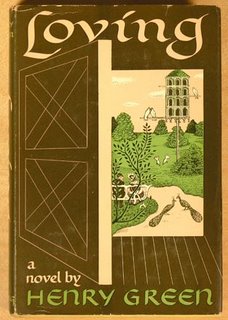 Henry Green's novel Loving (1945)(see Wood’s TLS article on Green, from the TLS last January).
Henry Green's novel Loving (1945)(see Wood’s TLS article on Green, from the TLS last January).
Naturally, I haven't read any of them; this is the first I've heard of Green, in fact. His novel sounds intriguing, set as it is among a bunch of servants in a castle in Ireland during WWII. I didn't get to ask Wood what he thought of Bowen, or of any other Irish writers; his slow, somewhat agonised but still fascinating revelation of his favourites was then intercepted by a bland question about marketing and the young writer (snore), so there were revealed no more than these. But at least it saved me from yet again displaying my provincial tendencies for all to see.
Posted by
hesitant hack
at
12:16 AM
1 comments
![]()
Monday, October 02, 2006
Welcome to the BQE, Bitch
 Sometimes we forget that we live in Brooklyn, and allow ourselves to be deluded into thinking that we've been transported into some less crowded version of the Village, except with fewer tourists, fewer strollers, better bars and lower rent. And then some actual CRIMINALS steal a van and set it on fire outside our window! At six o'clock in the evening! On Yom Kippur!! (Ok, ok, the last bit was just overkill.)
Sometimes we forget that we live in Brooklyn, and allow ourselves to be deluded into thinking that we've been transported into some less crowded version of the Village, except with fewer tourists, fewer strollers, better bars and lower rent. And then some actual CRIMINALS steal a van and set it on fire outside our window! At six o'clock in the evening! On Yom Kippur!! (Ok, ok, the last bit was just overkill.)

Man, we live an edgy life. I'm surprised some gangsta types aren't vying to shoot me in the head even as I write this. It must be the sound of the first ever JK Ensemble, streaming live from the wireless, that's saving me. By tomorrow, I expect to hear a playlist consisting of Bonnie Prince Billy and improvisations on Bach banging through the car windows of all the young men cruising (but not in the Village sense of the word) out there. And then, in a nice piece of symmetry, JK will open Wednesday's show by spinning the current boom-car fave, "You Already Know I Want to Fuck You (Fuck You, Fuck You)". And Ana Leddy will finally realise the enormity of her mistake.
Posted by
hesitant hack
at
9:23 AM
4
comments
![]()
Labels: brooklyn
Sunday, October 01, 2006
Barry Egan, Journalist of the Year

1. From today's Sindo, a primer in thoughtful, balanced, consistent prose:
IT'S official. Marian Keyes couldn't leave the house if they did away with hair dyes. "I would kill myself," she insists. (Mercifully, Marian was unsuccessful in a real suicide attempt in 1994.)
2. Conversation Chez Empire State View upon the reading-out-loud of the above paragraph earlier today:
ESV: "...in a real suicide attempt in 1994."
A: "Jesus Christ!"
(cue two minutes of hysterical laughter and one terrified kitten)
ESV: I'm going to put that on my blog.
A: Do.
(ESV types and mutters)
ESV: But I need a picture to go along with it, and all I get when I type in "Barry Egan" is Adam Sandler's character from Punch Drunk Love. I need a greasy, ginger "celebrity"...
A: Use Mick Hutchence.
ESV: Who?
A: Mick Hutchence.
ESV: Whose "real suicide attempt in 1994"* was successful?
A: Oh yeah.
ESV: Hucknall.
A: That's the one.
Max the Kitten: Where did you hide that roast chicken, youse bastards?
*yeah, yeah, 1997, whatever.
Posted by
hesitant hack
at
3:50 PM
20
comments
![]()
Labels: bazza, irish media
